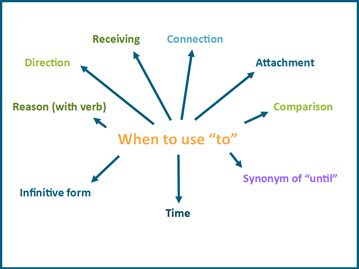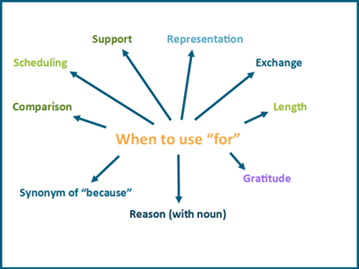“To” and “for” are two of the most common prepositions in English. They are also two of the more confusing prepositions and are often mixed up.
The general difference between ‘to’ and ‘for’
Generally, ‘to’ and ‘for’ differ in their meanings and the words they’re typically used with. Here’s how they differ:
When to use the preposition ‘to”

Expressing movement towards something: direction.
For example:
We are going to the park this afternoon.
Showing who or what receives an action or item: receiving.
For example:
Ben passed the puck to Raj across the ice.
Showing an abstract link between two people: connection.
For example:
As we are cousin, I am related to you.
Showing a physical attachment between two things: attachment.
For example:
He chained his bike to the bike rack.
Introducing the second part of a comparison: comparison.
For example:
I prefer orange juice to water.
Describing why something happened: reason (with verb).
For example:
I do my homework every day to get good grades.
In the infinitive form of a verb: infinitive form.
For example:
I want to be a teacher when I grow up.
Before a certain time: time.
For example:
It’s a quarter to eight.
Synonym of “until”.
For example:
We played volleyball from dawn to dusk.
When to use “for”

To indicate agreement or favor toward something: support.
For example:
I root for the blue team.
To show an action on behalf of or representing something else: representation.
For example:
I work for a large engineering company.
To introduce the second part of a purchase, deal or trade: exchange.
For example:
I’ll trade you my skates for your helmet.
To indicate length of time or distance: length.
For example:
I went to Springfield elementary for six years.
To show gratitude or thanks: gratitude.
For example:
Thank you for the wonderful flowers.
To describe why something happened: reason (with noun).
For example:
We must put in extra practice for the Olympics.
Synonym of “because”.
For example:
Please don’t stay out late at night, for it’s dangerous.
Comparisons with what’s normal: comparison.
For example:
He’s tall for his age.
To indicate a planned arrangement in the future: scheduling.
For example:
Can I make an appointment for Wednesday next week?
Using “to” or “for” with purpose and reason
When it comes to reading and explaining why, the simple difference between to and for is:
"To" is used with verbs.
For example:
I came to school to see you.
"For" is used with nouns.
For example:
I came here for you.
Using important to or important for
Important to indicates personal or sentimental value.
For example:
This necklace is important to me as it belonged to my grandmother.
Important for indicates a practical benefit.
For example:
Attending school every day is important for me.
Using to or for when receiving something
When you’re talking about someone receiving something directly, use to.
For example:
I gave a bunch of flowers to my aunt.
When you’re talking about the reason or purpose behind doing something (and not the direct action of giving), use for.
For example:
I bought a bunch of flowers for my aunt.

